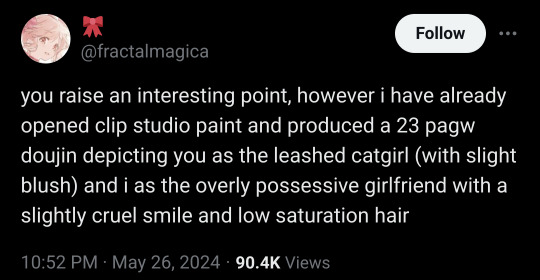I am accepting my snakegirl reality. Barghest's long snake wife. Assigned Ho'olheyak kin accidentally by Discord.
Last active 60 minutes ago
Don't wanna be here? Send us removal request.
Text
If you think about it, having a sizable quantity of followers on tumblr dot com makes me basically a princess, and therefore you should treat me like one
479 notes
·
View notes
Text
Still in princess mode. I need a devoted subject to praise me and pet me on the head and maybe even hold me in her arms while I sleep
129 notes
·
View notes
Text
“you’re going to DELETE a post you AGREED with just cuz you found out ops a terf??”
yeah turns out learning that people having uber bigoted ideologies changes the context of the post buddy
184K notes
·
View notes
Text
Me: I don't really believe in gatekeeping a field where anyone can learn with enough work. The training we get in academia isn't impossible to self-teach.
Also me: The number of people calling themselves "historians" or pretending to educate about history on social media when they're just reading Wiki or telling you fun facts is way too high. The job title has meaning. You wouldn't call yourself a mathematician for knowing how to make your graphing calculator make graphs.
6K notes
·
View notes
Text
A lot of leftist accounts are suspiciously quiet on the section 504 lawsuit, proposed medicaid cuts, and the "make America healthy again" executive order.
I know other leftists are not the enemy but if we don't have able bodied allies and general population support, there's no hope of pushing back against these ableist policies. These big accounts ignoring a massive minority at risk is scary. The current admin is the problem but there's no hope of a solution without allyship.
We need visibility. We need allies.
11K notes
·
View notes
Note
"30 years old isn't old man" what privilege do you live in where your life expectancy is far past 30 years
This post blindsided me so bad I spent a full minute staring at it in shock
27K notes
·
View notes
Text

Saileach is so lanky!
Her legs are super long!! I cannot believe that she is only 166cm, therefore, I will not. She is at least 200cm to me (and also has Marfan's Syndrome)
75 notes
·
View notes
Text

モルガン by かもあし [Twitter/X] ※Illustration shared with permission from the artist. If you like this artwork please support the artist by visiting the source.
90 notes
·
View notes
Text

alt bg version because wife deserves better
406 notes
·
View notes
Text

花嫁モルガン by ウンツエ [Twitter/X] ※Illustration shared with permission from the artist. If you like this artwork please support the artist by visiting the source.
565 notes
·
View notes
Text

【FGO】モルガンと着せ替えH by カフェナミ [Twitter/X] ※Illustration shared with permission from the artist. If you like this artwork please support the artist by visiting the source.
220 notes
·
View notes
Text

Stand off by 0Nineo9 [Twitter/X] ※Illustration shared with permission from the artist. If you like this artwork please support the artist by visiting the source.
250 notes
·
View notes





